In response to attempts to send incendiary packages by plane to countries allied with Ukraine and likely orchestrated by Russia, Transport Canada has radically tightened its rules on air freight for cargoes originating from 55 countries, mainly European.
This change introduced without notice was first reported by CBC News (New window).
Transport Canada now requires proof of a commercial relationship established
between the shipping company and the receiving company with a minimum of six shipments in the last 90 days.
Senders and recipients must also provide proof of payment for previous transactions.
At the time of writing, Transport Canada had not responded to our interview request.
This rule change comes after Federal Transport Minister Anita Anand indicated on Wednesday that she would take additional measures
to ensure the safety of passengers and packages, without providing further details.
Alleged conspiracy
Russia is accused of being behind a sabotage campaign against countries in theI'LL TAKE involving the sending of explosives by plane to damage European and North American infrastructure.
What we see […]it is really an intensification of Russian foreign operations in European countries with the aim of disrupting supply chains that could help Ukraine or that could harm European economies
explained Yan St-Pierre, CEO and counterterrorism consultant for Mosecon GmbH, a counterterrorism and security consulting firm based in Berlin, Germany.
In his opinion, this operation aims to weaken collaboration between the different countries of theI'LL TAKEwhich would explain why Canada is targeted. As an active member of theI'LL TAKECanada is indeed a target
he said.
If we sow a little more discord within NATO partners, if NATO's transport capabilities are increasingly affected, if the burden increases for certain countries because it is difficult to have a better logistics in other countries means that the entire NATO system is affected.
At the beginning of November, Poland and Lithuania announced that they had arrested several people suspected of being involved in a case of sending incendiary packages to different countries in Europe, some of which caught fire this summer in the warehouses of the DHL logistics group in Germany and Great Britain.
International search notices have also been launched to find two other people allegedly linked to this plot.
According to the Polish authorities, those arrested are linked to foreign intelligence activities
. They planned to attack, initially, targets in member countries of the European Union and the United Kingdom and then turn towards Canada and the United States.
The group targeted industrial facilities or critical infrastructure such as airports, airplanes and other vehicles in which packages were expected to ignite during land and air transit.
According to the intelligence services of several Western countries, including that of the United Kingdom, these attacks are the work of Russian military intelligence services, more commonly known as GRU. They would be an integral part of the hybrid warfare
that Moscow is leading against Ukraine's allied countries.
Interview with the director of the International Aeronautics and Civil Aviation Observatory, Mehran Ebrahimi
Canada subsequently expressed this concern directly to Russia, which completely denies these accusations.
On Friday, Moscow summoned a senior diplomat from the Canadian embassy in Russia to brief it that these conjectures […] testify to the probable preparation of a gross anti-Russian provocation
.
Russia has accused Canada of participating in hybrid warfare
against Russia by supplying weapons to Ukraine and encouraging participation of Canadian mercenaries in hostilities alongside the kyiv regime with the blessing of the Trudeau government
.
Any hostile action will not go unanswered […]. Canadian authorities should exercise caution and refrain from taking harmful actions that would escalate the confrontation with Russia
the Russian ministry further indicated.
Don't panic
According to the director of the International Aeronautics and Civil Aviation Observatory, Mehran Ebrahimi, Canadians about to take a plane should not worry about parcel bombs being there.
Safety is an obsession in aviation, whether it's building planes or working with planes.
he said in an interview on the show First the info on HERE RDI.
On the other hand, Canadian authorities must increase the level of vigilance. When we're dealing with bands of isolated people carrying out terrorist acts, that's one thing. But when it is a State which is [à l’origine de ces actes]it makes things more complicated
he declared.
Mr. Ebrahimi, who is also a professor at theUQAM, welcomes Transport Canada's decision to tighten its rules on air cargo, but believes that it should not be just settle for that
. The authorities must protect themselves not only against physical attacks but also against cyberattacks, according to him. Russia has the necessary means, agents and infrastructure outside its territory to organize [de tels actes] malicious.
The implementation of these new measures is, however, criticized by the general director of the Canadian International Freight Forwarders Association, Bruce Rodgers. The members of his association were not informed of these rules, which destabilized them a few weeks ago.
We attempted to obtain information directly from Transport Canada. Officials told us that due to the Aeronautics Act, they were unable to disclose this information to freight forwarders, who are responsible for controlling the movement of goods. They only communicated them to the airlines
lamented Mr. Rodgers in an interview.
There are much better measures that could have been implemented
he adds. I think they really don't understand how business works.
The Government of Canada is aware of and is very concerned about Russia's intensifying campaign, whether through cyber incidents, disinformation operations or sabotage activities.
said Global Affairs Canada in a statement sent to -.
According to this ministry, no imminent threat weighs on Canadians at this time
. He also emphasizes that Canadian national security and law enforcement agencies are working closely with our allies on this important issue to keep Canadians safe
.
With information from CBC News, by Nicolas Bourcier and Élyse Allard







